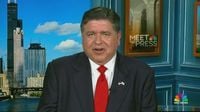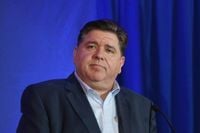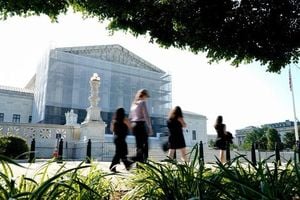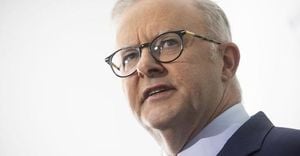On August 11, 2025, President Donald Trump ignited a firestorm of controversy by announcing the deployment of the National Guard to Washington, D.C., and hinting that Chicago and other major American cities could be next in line for federal intervention. As Trump declared a federal takeover of the D.C. Metropolitan Police Department, he labeled Chicago a "disaster" and called both Illinois Governor JB Pritzker and Chicago Mayor Brandon Johnson "incompetent." The president's remarks, delivered from the White House briefing room and flanked by top officials, set the stage for a heated national debate over federal authority, local control, and the future of urban law enforcement.
"It's going to go pretty quickly. And if we need to, we're going to do the same thing in Chicago, which is a disaster," Trump said, according to Block Club Chicago. He continued, "We have a mayor there who's totally incompetent. He's an incompetent man, and we have an incompetent governor there — Pritzker is an incompetent." The president's comments were not limited to Chicago; he also named New York and Los Angeles as potential targets for similar intervention, urging those cities to "self-clean up."
Trump's rhetoric came despite the fact that, according to city data, Chicago has seen a marked decline in violent crime this year. Through August 9, the city reported 246 murders, down from 359 during the same period in 2024. Robberies have dropped by 32 percent and shootings by 39 percent, a trend Mayor Brandon Johnson was quick to highlight. In a statement responding to Trump's remarks, Johnson said, "If President Trump wants to help make Chicago safer, he can start by releasing the funds for anti-violence programs that have been critical to our work to drive down crime and violence. Sending in the National Guard would only serve to destabilize our city and undermine our public safety efforts." Johnson also pointed out that the Trump administration had recently cut $158 million in funding for violence prevention programs in cities like Chicago, on top of dismantling the Office of Gun Violence Prevention and terminating more than $800 million in grants for anti-violence initiatives nationwide.
Governor JB Pritzker, a frequent and vocal critic of Trump, did not mince words in his own response. Speaking at an unrelated press conference, Pritzker dismissed Trump's legal authority to send troops into Chicago or other cities, citing the federal Posse Comitatus Act, which limits the use of federal troops for civilian law enforcement. "He has absolutely no right, and no legal ability, to send troops into the city of Chicago. And so I reject that notion," Pritzker said, as reported by NBC Chicago. He added, "There is a law on the books, confirmed by the Constitution, called posse comitatus. And it means that the federal government does not have a right to send soldiers into American cities for the purpose of, well, for any purpose really, but specifically to fight crime."
Pritzker went further, drawing a historical parallel that underscored the gravity with which he viewed the situation. "Having said that…the Nazis in Germany, in the '30s, tore down a constitutional republic in just 53 days. It does not take much, frankly, and we have a president who seems hell-bent on doing just that," Pritzker stated, echoing concerns about the erosion of democratic norms.
The legal debate over federal intervention is not merely academic. As the Washington Post detailed, Washington, D.C., is uniquely vulnerable to federal control because it is not a state, allowing the president greater authority over its police and governance. However, the situation in other cities is far less clear-cut. The Trump administration's previous deployment of National Guard troops and Marines to Los Angeles in June 2025, over the objections of California officials, is currently being challenged in court. The New York Times reported that the initial deployment was ruled illegal but later allowed to continue by an appeals court. The outcome of this legal battle could set a precedent for future federal interventions in state affairs.
Amid the legal wrangling and political theater, personal attacks flew between Trump and Pritzker. The president claimed, inaccurately, that Pritzker had been "thrown out" of his family business, a charge fact-checked and refuted by multiple outlets. Pritzker left Pritzker Private Capital when he became governor in 2019, a move planned as part of his transition to public service. Responding to the personal barbs, Pritzker shot back, "I don't really want to respond to criticism from Donald Trump, who inherited his money and then went bankrupt six times, and then defrauded his business partners. And, by the way, he cheats at golf." Pritzker continued, "I have had a successful business career, and I chose to run for governor because I believed our state was headed in the wrong direction. We have righted the ship. . . .We have a whole lot more work to do, no doubt about it. But my intentions are clear and, unlike the president, I'm not trying to make money off my public position."
Trump's comments also touched on Illinois' "no cash bail" policy, which he labeled a "disaster" and vowed to end. Yet, as city officials and data indicate, Chicago's crime rates have been trending downward, a fact Mayor Johnson emphasized in his public remarks. "Last week, we learned that President Trump cut another $158 million in funding for violence prevention programs in cities like Chicago. These cuts are on top of the Trump administration dismantling the Office of Gun Violence Prevention and terminating more than $800 million in grants for anti-violence programs across the country," Johnson said. "Sending in the National Guard would only serve to destabilize our city and undermine our public safety efforts."
The political undercurrents of the confrontation are impossible to ignore. Governor Pritzker, who recently announced his run for a third term as Illinois governor, has not ruled out a presidential bid in 2028. Asked about his intentions on NBC's Meet the Press, Pritzker said, "I can't rule anything out, but what I can rule in is that no matter what decisions I make, and I mean in particular about what I do here in the state of Illinois, is about the people of Illinois." He reaffirmed that his current focus is on serving Illinois, but speculation about his national ambitions continues to swirl. Pritzker has also named former state representative Christian Mitchell as his running mate, as Lt. Gov. Juliana Stratton seeks a U.S. Senate seat. Meanwhile, several challengers, including DuPage County Sheriff James Kendrick, businessman Joseph Severino, and Phil Perez, have announced bids for the governor's office.
Senator Dick Durbin weighed in on the broader implications of Trump's actions, warning that the president was "rewriting laws in every state." Durbin advised, "He should focus on the laws he's responsible for. The big beautiful budget, so to speak, is a bill that's devastating for the American economy and the American people. He ought to address that."
As the legal, political, and rhetorical battles rage on, the future of federal intervention in American cities hangs in the balance. The outcome of the ongoing court case over the deployment of troops in Los Angeles may well determine whether Trump's threats become reality elsewhere. For now, Chicago's leaders remain defiant, insisting that local progress on crime and public safety should not be overshadowed by federal grandstanding or political score-settling.






